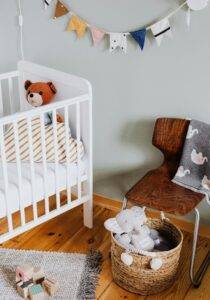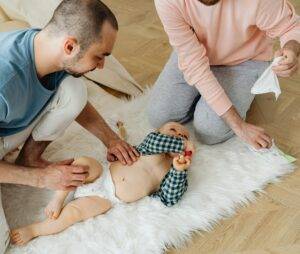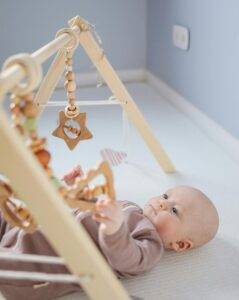Welcoming a newborn baby into your life is an incredible and joyous experience. However, it can also be overwhelming for new parents. With so many things to prepare and remember, having a complete newborn baby to-do list makes all the difference.
This guide will walk you through everything you need to know and do before your baby arrives and during those crucial first few months. Let’s dive into the ultimate newborn baby to-do list to ensure you and your baby are ready for this wonderful journey.
Preparing for Your Newborn Baby: Make a Newborn Baby To-Do List
Set Up the Nursery

One of the most exciting tasks in the newborn baby to-do list is setting up the nursery. Here’s what you’ll need:
- Crib: Ensure it meets safety standards, such as having slats no more than 2 3/8 inches apart to prevent the baby’s head from getting stuck.
- Mattress: Choose a firm, snug-fitting mattress to reduce the risk of Sudden Infant Death Syndrome (SIDS).
- Bedding: Use fitted sheets, and avoid pillows and blankets that could pose suffocation risks. Opt for a sleep sack instead.
- Changing Table: Select one with plenty of storage for diapers, wipes, and creams to keep everything within reach.
- Rocking Chair or Glider: This will be invaluable for soothing your baby during late-night feedings or fussy periods.
- Nightlight: A soft, dim nightlight can make nighttime feedings and diaper changes easier without fully waking the baby.
Setting up the nursery can be a bonding experience for parents as they prepare for the arrival of their little one. Ensure the crib and mattress comply with current safety standards to prevent hazards. Opt for fitted sheets and avoid loose bedding to reduce the risk of suffocation or Sudden Infant Death Syndrome (SIDS).
A changing table with ample storage will keep essentials like diapers, wipes, and creams within easy reach, making diaper changes more efficient. Including a comfortable chair, such as a rocking chair or glider, will be invaluable for soothing your baby during feedings or late-night wake-ups.
A nightlight with a soft glow can make nighttime feedings and diaper changes more manageable without overstimulating your baby or waking them up completely.
Gather Newborn Essentials
Stock up on these newborn essentials to ensure you’re well-prepared in your newborn baby to-do list:
- Diapers: Have a good supply of both disposable and cloth diapers. Newborns can go through ten or more diapers a day.
- Wipes: Choose sensitive and fragrance-free wipes to avoid irritating your baby’s delicate skin.
- Clothing: Newborns need onesies, sleepers, and mittens. Look for soft, breathable fabrics.
- Swaddle Blankets: Swaddling can help your baby feel secure and sleep better.
- Bottles and Formula: If you’re not breastfeeding, have formula and bottles ready. Sterilize the bottles before first use.
- Pacifiers: Have a few different types on hand to see which one your baby prefers.
- Baby Bath: A small bathtub with gentle baby soap and shampoo is essential for bath time.
Prepare for Feeding
Feeding is a major part of caring for a newborn. Here’s what to include in newborn baby to-do list:
- Breast Pump: If you plan to breastfeed, a breast pump can help you store milk and relieve engorgement.
- Formula: For bottle-feeding moms, choose a formula that meets your baby’s nutritional needs.
- Bottles and Nipples: Select bottles with slow-flow nipples designed for newborns to help prevent choking.
- Burp Cloths: Keep plenty of burp cloths handy for those inevitable spit-ups during and after feedings.
- Nursing Pillow: This pillow provides support and comfort for mom and baby during feedings.
Plan for Baby’s Health
Ensuring your baby’s health is crucial. Prepare these items and plans:
- Pediatrician: Choose a pediatrician and schedule the first visit within the baby’s first week.
- First Aid Kit: Stock a kit with baby-specific items like a digital thermometer, nasal aspirator, and infant acetaminophen.
- Immunizations: Understand the immunization schedule and its importance in protecting your baby’s health.
- Health Insurance: Ensure your baby is added to your health insurance policy to cover medical expenses.
- Baby Monitor: A baby monitor allows you to keep an ear (and sometimes an eye) on your baby while they sleep.
Prepare Your Home
Make your home safe and comfortable for your baby:
- Baby-Proofing: Secure furniture to walls, cover electrical outlets, and install safety gates at the top and bottom of stairs.
- Cleaning Supplies: Choose non-toxic, baby-safe cleaning supplies to keep your home clean without exposing your baby to harmful chemicals.
- Laundry: Use gentle, fragrance-free detergent to wash your baby’s clothes, bedding, and cloth diapers.
- Pet Preparations: If you have pets, gradually introduce them to the baby’s scent and ensure they are up-to-date on vaccinations.
Bringing Your Newborn Baby Home
Car Seat Safety
A car seat is a must-have for bringing your baby home. Here’s what to check:
- Installation: Ensure the car seat is installed correctly. Many fire stations or hospitals offer free car seat checks.
- Rear-Facing: Keep the car seat rear-facing as long as possible, as it provides the best protection in case of a collision.
- Check Expiry Date: Car seats have expiration dates, so ensure yours is still safe.
Establish a Routine
Creating a routine helps both you and your baby adjust:
- Feeding Schedule: Feed your baby on demand, typically every 2-3 hours. Watch for hunger cues like rooting and sucking on fingers.
- Sleep Schedule: Newborns sleep 16-17 hours a day. Learn their sleep cues, such as rubbing eyes or fussiness.
- Bath Time: Establish a calming bedtime routine including a warm bath, gentle massage, and quiet time.
Bonding with Your Baby
Bonding is essential for your baby’s emotional and physical development:
- Skin-to-Skin Contact: Holding your baby skin-to-skin can help regulate their body temperature and heart rate while promoting bonding.
- Talking and Singing: Interact with your baby by talking, singing, and making eye contact. This supports language development and emotional bonding.
- Reading: This promotes cognitive development and creates a soothing bedtime routine.
Managing Visitors
Visitors can be overwhelming for new parents and newborns. Here’s how to manage:
- Set Boundaries: Communicate visiting hours and any rules you have, such as not visiting if you don’t feel unwell.
- Hygiene: Ensure visitors wash their hands before holding the baby and avoid kissing the baby’s face.
- Rest Time: Make sure you and the baby get enough rest. Don’t hesitate to limit visiting hours.
Tips for New Parents
Self-Care is Important
- Rest: Sleep when the baby sleeps to ensure you’re getting enough rest.
- Nutrition: Eat balanced meals to keep your energy levels up. Keep healthy snacks and water nearby, especially if you’re breastfeeding.
- Support System: Don’t hesitate to ask for help from family and friends. Whether it’s bringing a meal or watching the baby for an hour.
Trust Your Instincts
- You Know Best: Trust your gut feelings about what’s right for your baby. Every baby is different, and you know your baby better than anyone.
- Learn and Adapt: Parenting is a learning process. It’s fine to make mistakes and learn from them. Adapt your approach as you discover what works best.
Seek Help When Needed
- Pediatrician: Regular check-ups are essential. Don’t hesitate to call for concerns or questions about your baby’s health.
- Lactation Consultant: If you’re having trouble breastfeeding, a lactation consultant provides valuable support and guidance.
- Parenting Classes: These classes offer practical advice and connect you with other new parents experiencing similar challenges.
Resources for New Parents
Online Communities
Join online communities for support and advice:
- BabyCenter: Forums and articles provide information and a sense of community for new parents.
- What to Expect: This community and app offers tools for tracking your baby’s development and connecting with other parents.
Books and Guides
Reading can provide valuable insights and tips:
- “What to Expect the First Year”: A comprehensive guide covering all aspects of your baby’s first year.
- “The Happiest Baby on the Block”: This book offers techniques for soothing and calming your baby, which can be incredibly helpful during those first few months.
Professional Advice
Don’t underestimate the value of professional advice:
- Pediatrician Consultations: Regular visits to your pediatrician are essential for monitoring your baby’s health and development.
- Therapists and Counselors: If you’re feeling overwhelmed, professional mental health support can help you navigate the challenges of new parenthood.
Common Newborn Challenges and How to Handle Them
Dealing with Colic
This is a common issue where a baby cries excessively and is difficult to soothe. Here’s how to manage it:
- Comforting Techniques: Try swaddling, rocking, or a warm bath to soothe your baby.
- Burping: Ensure your baby is properly burped after feedings to reduce gas.
- Dietary Changes: If breastfeeding, avoid spicy foods and caffeine, as these affect your baby.
Managing Sleep Issues
Newborns often have irregular sleep patterns. Here’s how to improve sleep:
- Establish a Routine: Create a consistent bedtime routine to signal to your baby that it’s time to sleep.
- Safe Sleep Environment: Place your baby on their back in a crib without pillows, blankets, or toys.
- Soothing Techniques: Use a white noise machine or gentle rocking to help your baby fall asleep.
Handling Feeding Challenges
Feeding issues can be stressful for new parents. Here’s how to address them:
- Latching Problems: If breastfeeding, ensure your baby has a proper latch. A lactation consultant can help.
- Bottle Feeding: If bottle feeding, choose a nipple flow that suits your baby’s age and feeding style.
- Feeding Schedule: Pay attention to hunger cues and establish a regular feeding schedule.
Coping with Postpartum Recovery
New moms need to take care of themselves too. Here’s how to manage recovery:
- Rest and Hydration: Drink plenty of water and rest as much as possible.
- Pelvic Floor Exercises: Gentle exercises can help with postpartum recovery.
- Emotional Support: Talk to your partner, friends, or a counselor about your feelings and experiences.
Creating a Supportive Environment
Involving Your Partner
Parenting is a team effort. Here’s how to involve your partner:
- Sharing Responsibilities: Divide routine tasks such as diaper changes, feeding, and household chores.
- Bonding Time: Encourage your partner to spend one-on-one time with the baby to strengthen their bond.
- Communication: Keep open lines of communication about your needs and concerns.
Connecting with Other Parents
Building a network of support can be invaluable. Here’s how to connect:
- Parenting Groups: Join local or online parenting groups to share experiences and advice.
- Playdates: Arrange playdates with other new parents to give your baby social interaction and yourself a support network.
- Community Resources: Take advantage of community resources like libraries, which often offer free baby classes and events.
Preparing for Milestones
Tracking Development
Monitoring your baby’s milestones helps ensure they are developing properly:
- Growth Charts: Keep track of your baby’s growth and discuss it with your pediatrician.
- Developmental Milestones: Be aware of key milestones such as smiling, rolling over, and sitting up.
- Pediatrician Visits: Regular check-ups help track development and catch potential issues early.
Encouraging Development
You can actively encourage your baby’s development through play and interaction:
- Tummy Time: This helps strengthen your baby’s neck and shoulder muscles.
- Interactive Play: Use toys and games that stimulate your baby’s senses and encourage movement.
- Reading and Talking: Regularly read to and talk with your baby to support language development.
Make a To-Do List for a Stress-Free Baby’s Arrival
Becoming a parent is a journey filled with joy, challenges, and endless love. With this newborn baby to-do list, you’re better prepared to welcome your little one into the world. Every baby is unique, and it’s fine to adapt this list to suit your needs. Trust yourself, seek support when needed, and enjoy every precious moment with your new baby.
For more tips on parenting and baby care, check out these helpful articles from Omegapediatrics.com:
- 4 Things to Consider in Creating a Safe Sleep Environment for Your Baby
- 11 Key Milestones to Watch For: Parents’ Comprehensive Guide in Baby Development
With this helpful guide, you’ll be well on your way to creating a safe, loving, and nurturing environment for your newborn. Happy parenting!







